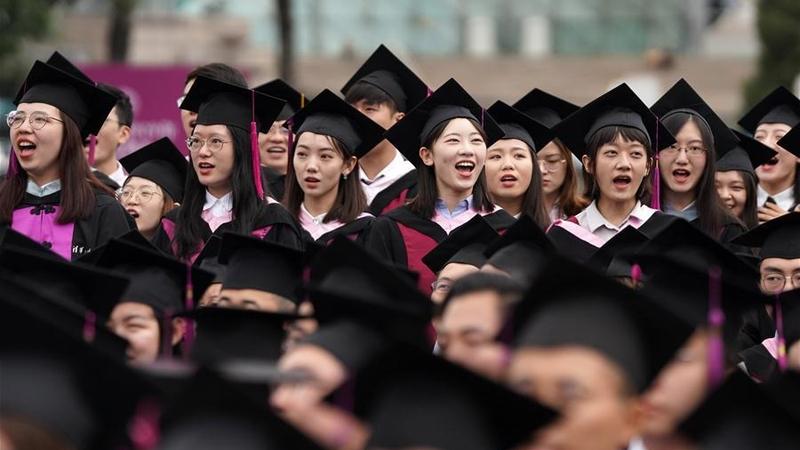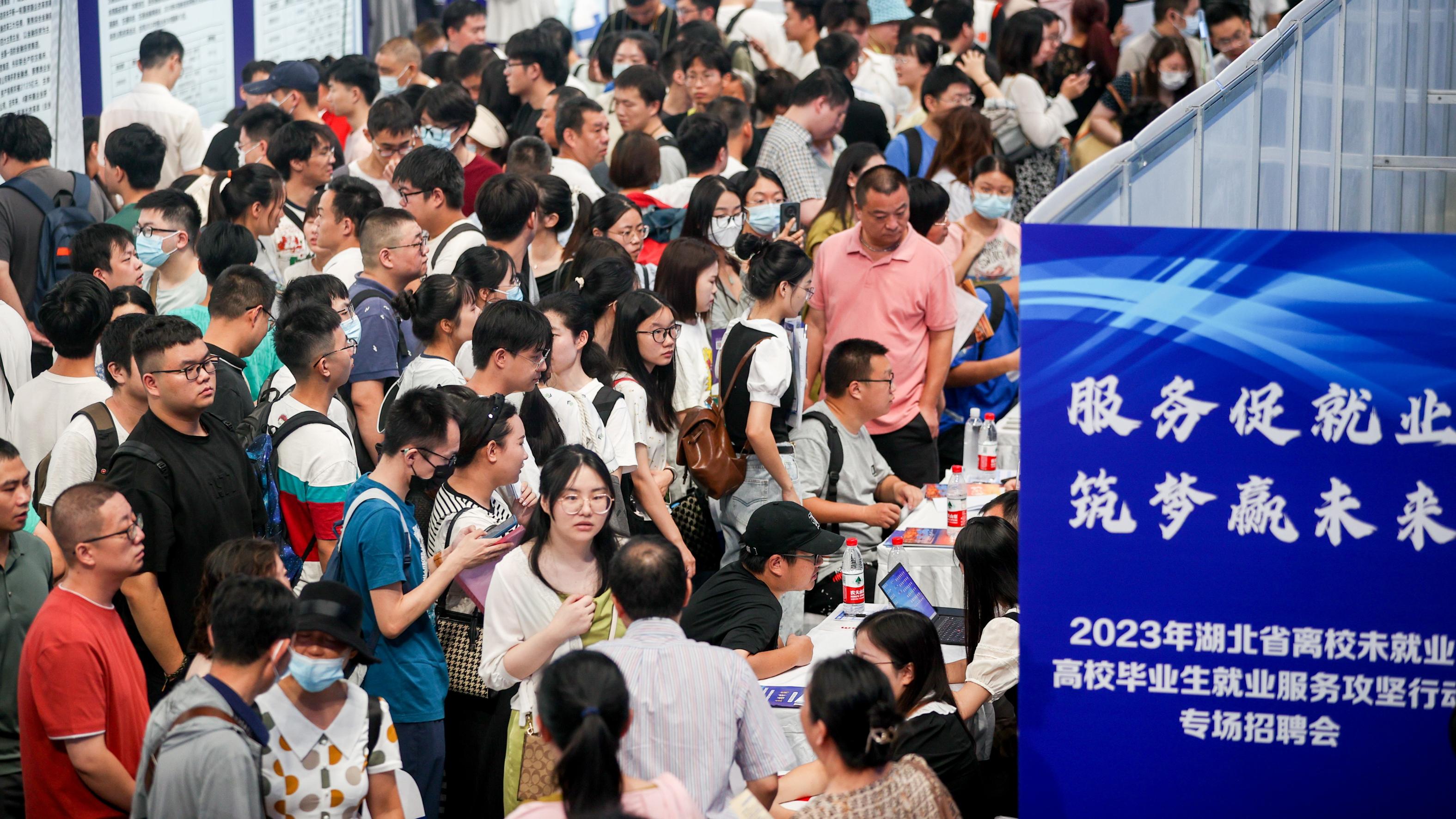Selecting a particular major no guarantee of landing a well-paid job
 This undated photo shows Graduates attending the commencement ceremony of Tsinghua University held in Beijing. (PHOTO / XINHUA)
This undated photo shows Graduates attending the commencement ceremony of Tsinghua University held in Beijing. (PHOTO / XINHUA)
After four years of studying Russian for a bachelor's degree at a university in Shenyang, the capital of Liaoning province, and two years of postgraduate studies in journalism at a university in Russia, Ma Qi still hasn't found a suitable job. She believes this is because she chose the wrong subjects.
"I've been looking for jobs for three months, and the highest salary I was offered was 4,000 yuan ($554) per month, without the guarantee of a two-day break during weekends," she said last month, adding that she is now considering pursuing doctoral studies.
No matter which major they choose, students cannot be deterred from exploring an unknown world, as at college they will enrich their knowledge and broaden their horizons.
He Zhiwei, a director of China Agricultural University’s undergraduate school
Like Ma, a rising number of college graduates are complaining about their university majors on social media platforms, saying their studies have not helped them land satisfactory jobs.
In addition to liberal arts subjects such as foreign languages and journalism, some engineering majors,including bioengineering, chemical engineering, environmental science and materials science, have been labeled by students as poor subject choices.
The term "super-entrapped major "has become a catchphrase on several social media platforms, with some netizens talking students out of their studies due to their own experiences.
Experts are also offering study suggestions to students who will graduate soon.
Zhang Xuefeng, founder of the education company Fengxue Weilai, made headlines recently when he said during a live-streaming broadcast that he would "knock out" his child if the child wanted to study journalism at university, as journalism graduates typically do not earn high salaries.
Zhang has also dissuaded students against choosing subjects such as philosophy, education, business management, foreign languages, finance, bioengineering, chemical engineering, environmental science, and materials science.
He believes that subjects such as law, Chinese language, politics, math and computer sciences are good because it is easy for graduates studying them to find well-paid jobs.
Ma said she chose to pursue postgraduate studies in journalism because she could not find a good job despite having a bachelor's degree in Russian. Yet a master's in journalism still cannot guarantee her a decent salary. "So, for me, both majors are entrapped ones," she said.
When she graduated from college in 2021, she could only find a job in foreign trade that paid 1,800 yuan per month. She said human resources staff members told her that if she did not want the position, plenty of others did.
Ma feels that studying Russian favors male students, as they are more likely to be sent to Russia by companies. To land a good job, she recommends studying Russian at institutions with a good reputation, such as Beijing Foreign Studies University.
"If like me, you studied Russian at an ordinary university, the chances are you will also be unable to find a good job, as there are just too many students studying that language, and there is not that much demand," she said.
She added that only one of her six roommates at college chose not to pursue postgraduate studies, but despite putting in the extra work, she and the other four could not find good jobs.
 Students look for jobs at a career fair for graduates at Southeast University in Nanjing, Jiangsu province, on April 16, 2023. (LIU LI / FOR CHINA DAILY)
Students look for jobs at a career fair for graduates at Southeast University in Nanjing, Jiangsu province, on April 16, 2023. (LIU LI / FOR CHINA DAILY)
Time-consuming work
Zheng Yang, who graduated from Zhejiang University with a master's in biology, also believes that his subject is not a good one.
"If you want to find a decent job in biology, you must have a doctoral degree," he said.
When he graduated in 2018, Zheng could only find work that paid 7,000 yuan to 8,000 yuan a month, while graduates with a master's in information technology can easily find jobs that offer at least double that salary.
However, he said students need to make great efforts to obtain a master's in biology, adding that during his postgraduate studies, he worked for about 14 hours a day doing experiments.
Although he worked extremely hard, he did not graduate on time, and had to defer his studies for more than a year to complete his experiments and dissertations.
Postgraduate students are considered cheap labor for university supervisors, who only offer them low pay to perform time-consuming work. As a result, students frequently defer their studies, Zheng said.
"My supervisor told us that if his children want to study biology in the future, he would beat them up, because the pains far outweigh the gains," he said.
Zheng added that he chose biology, as at that time it was commonly thought that the 21st century would be a time for biology and gene-editing technology.
"However, after I embarked on my studies, I began to realize just how boring and time-consuming the major is and how difficult it is to graduate," he said, adding that some of his classmates gave up halfway through their studies.
Zheng said many of his former classmates decided against working in the field of biology, choosing instead to use their degrees from reputable universities as stepping stones to other careers.
 University graduates attend a job fair at Hongshan Gymnasium in Wuhan, capital of Hubei province, on Thursday. More job openings and favorable policies have been made available to job seekers, including those who haven't landed jobs after their graduation. (SHEN YI / FOR CHINA DAILY)
University graduates attend a job fair at Hongshan Gymnasium in Wuhan, capital of Hubei province, on Thursday. More job openings and favorable policies have been made available to job seekers, including those who haven't landed jobs after their graduation. (SHEN YI / FOR CHINA DAILY)
Rising popularity
Zhang Xuefeng's outspokenness has made him a popular figure among parents and students.
He said he is offering his advice to students from less-privileged backgrounds, because for them, a job with a high salary should be more important than pursuing their interests.
Early this month, Zhang had more than 20 million followers on his Douyin account, a rise of 7 million in less than two months.
His supporters said he has "broken the information barrier", while his detractors think Zhang's suggestions are too shortsighted and profit-driven.
As a result of his popularity, demand for the subjects he has recommended, including computer science and Chinese language, has risen significantly this year, but it has fallen greatly for majors such as journalism and management.
Li Meng, a high school graduate from Anhui province, told the Jiemian media outlet that she has benefited from the "Zhang Xuefeng effect", as despite a relatively low enrollment score, she has been accepted to study journalism at Communication University of China. The "Zhang Xuefeng effect" refers to the comments made by the founder of the Fengxue Weilai education company.
Communication University of China has witnessed a significant drop in enrollment scores in many provincial regions.
Fresh burdens
The discussions about university subjects have added to the burden of students already studying so-called poor majors.
Xiang Yunxin, a second-year undergraduate student majoring in English education, said she is worried about her future, as both English and education are not considered by netizens to be good subjects.
She added that many students are studying English, but with a significant reduction in the number of academic tutoring institutions, competition for entry to schools to teach English has intensified.
Xiang believes that four years of undergraduate studies in English education cannot equip her with sufficient knowledge to land a good job, and that the postgraduate entrance exam has also become too competitive, with the number of applicants rising each year.
"I think English was a good major some 20 years ago, with China joining the World Trade Organization and needing lots of people who can speak that language well. But nowadays, there are just too many people who are extremely proficient in English, so students studying it have lost their competitive edge," she said.
The Ministry of Education has said some 20 percent of the university majors in China will be adjusted by 2025. Old majors will be dropped, while new ones will be introduced that are more suitable for new technology and industry.
The ministry said majors with employment rates of less than 60 percent for two consecutive years will be accorded fewer enrollment slots, and could even be canceled.
Warnings issued
Experts have cautioned students to focus more on their interests, rather than the popularity of majors, when choosing their university.
Meanwhile, not all students are following netizens' advice in only choosing popular majors.
Zhong Fangrong, who graduated from high school in Hunan province, made headlines in 2020 when she applied to Peking University, choosing archaeology as her major after scoring 676 out of 750 in the gaokao, or college entrance exam.
She ranked fourth among 194,000 liberal arts students in the province, and her score allowed her to choose almost any major at any school in the country.
As Zhong comes from a less-privileged family background, some netizens began judging her decision, saying she would regret it once she entered the job market.
Others expressed admiration and support for her. Museums and archaeological research institutes nationwide rallied behind Zhong, sending her archaeological books and cultural relic products.
Zhong is not alone in choosing a university major based on personal interests and aspirations, rather than the promise of a lucrative career.
Jin Baijiang, director of the student admission office at Nankai University in Tianjin, said a major should not be labeled "good" or "bad", "popular" or "unpopular", as all of them are created to meet demands from society and serve long-term national development.
He told Guangming Daily that while new majors will likely become popular, in time they might also become outdated, so it is unwise for students to pursue the latest trends.
He Zhiwei, a director of China Agricultural University's undergraduate school, said a university education is aimed at helping students cultivate independent thinking, form correct values, and find their future development path.
Students can and must go beyond their majors, and although university majors are significant for students' development, they cannot determine their future, she said.
"No matter which major they choose, students cannot be deterred from exploring an unknown world, as at college they will enrich their knowledge and broaden their horizons," she added.
Not all popular majors are suitable for all students, and rather than considering the popularity of a subject, students need to focus more on their interests, ability and the national development trend to find a suitable major, He added.
Qiao Jingzhong, a professor of education at Beijing Normal University, said students should not be too profit-driven when choosing majors. It is easier for them to make a difference when they learn things they are interested in, he added.
To acquire broad and professional knowledge, he advises students to choose basic disciplines for undergraduate studies, and an applied or vocational major for postgraduate studies.


